英语人教版九年级全册课件.ppt
人教版九年级全册Unit1课件 (共25张PPT)

listening to music when learning
sleeping in class
talking with other students in class
They are not good habits for learning English.
1. What does “Practice makes perfect.” mean? Keep practicing. 2. If successful learners make mistakes, what do they often do? They learn from mistakes.
Read, study and learn about everything imporant in your life
Read Paragraph 3 and answer the questions.
Practicing and learning from mistakes Good learners think about what they are good at and what they need to practice more. Remember, “Use it or lose it.” Even if you learn something well, you will forget it unless you use it. “Practice makes perfect.” Good learners will keep practicing what they have learned, and they are not afraid of making mistakes. Alexander Graham Bell did not invent the telephone overnight. He succeeded by trying many times and learning from his mistakes.
人教版九年级英语全一册全册完整课件
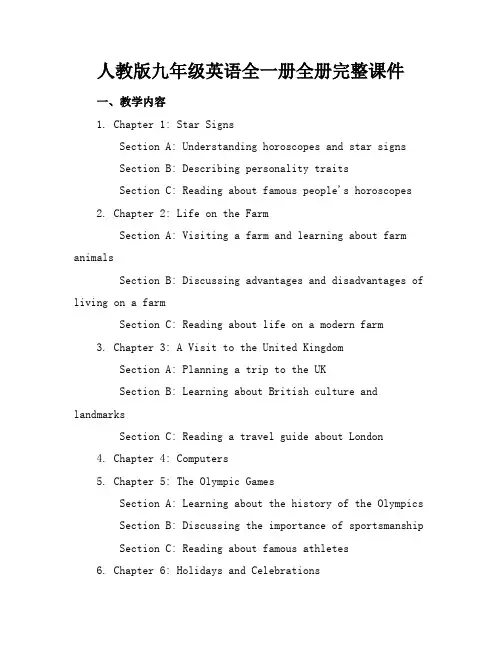
人教版九年级英语全一册全册完整课件一、教学内容1. Chapter 1: Star SignsSection A: Understanding horoscopes and star signsSection B: Describing personality traitsSection C: Reading about famous people's horoscopes2. Chapter 2: Life on the FarmSection A: Visiting a farm and learning about farm animalsSection B: Discussing advantages and disadvantages of living on a farmSection C: Reading about life on a modern farm3. Chapter 3: A Visit to the United KingdomSection A: Planning a trip to the UKSection B: Learning about British culture and landmarksSection C: Reading a travel guide about London4. Chapter 4: Computers5. Chapter 5: The Olympic GamesSection A: Learning about the history of the Olympics Section B: Discussing the importance of sportsmanship Section C: Reading about famous athletes6. Chapter 6: Holidays and CelebrationsSection A: Talking about favorite holidays and celebrationsSection B: Learning about different cultural traditionsSection C: Reading about holiday customs around the world二、教学目标1. 学生能够理解和运用所学词汇和句型,描述个人和事物特点。
人教版九年级英语全一册全册完整课件
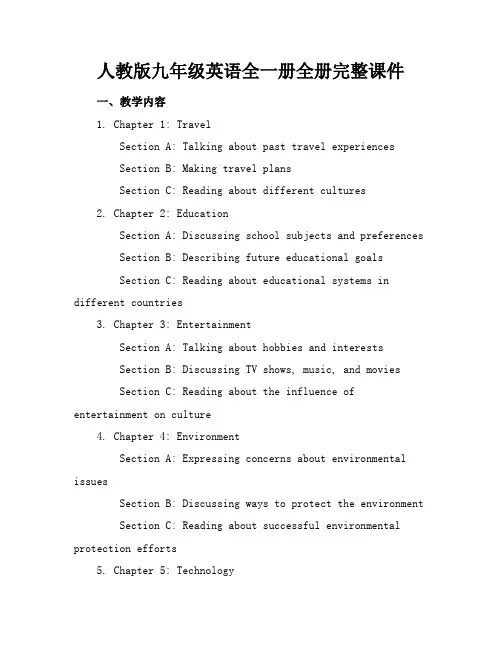
人教版九年级英语全一册全册完整课件一、教学内容1. Chapter 1: TravelSection A: Talking about past travel experiencesSection B: Making travel plansSection C: Reading about different cultures2. Chapter 2: EducationSection A: Discussing school subjects and preferences Section B: Describing future educational goalsSection C: Reading about educational systems in different countries3. Chapter 3: EntertainmentSection A: Talking about hobbies and interestsSection B: Discussing TV shows, music, and moviesSection C: Reading about the influence of entertainment on culture4. Chapter 4: EnvironmentSection A: Expressing concerns about environmental issuesSection B: Discussing ways to protect the environment Section C: Reading about successful environmental protection efforts5. Chapter 5: TechnologySection A: Using technology in daily lifeSection B: Discussing the advantages and disadvantages of technologySection C: Reading about technological innovations6. Chapter 6: HealthSection A: Talking about exercise and healthy habits Section C: Reading about the importance of mental health7. Chapter 7: JobsSection A: Discussing dream jobs and career aspirationsSection B: Describing job responsibilities and qualificationsSection C: Reading about successful entrepreneurs8. Chapter 8: CultureSection A: Exploring traditional festivals and customsSection B: Comparing different cultures and promoting cultural understandingSection C: Reading about cultural exchange programs9. Chapter 9: SafetySection A: Talking about safety rules and precautions Section B: Discussing emergencies and natural disastersSection C: Reading about safety education10. Chapter 10: Life GoalsSection A: Sharing life goals and aspirationsSection B: Setting realistic goals and planning for the futureSection C: Reading about inspirational individuals二、教学目标2. Cultivate students' ability to read and understand different text types.3. Enhance students' awareness of cultural diversity and promote cultural understanding.三、教学难点与重点1. Mastering target vocabulary and sentence structures.3. Improving speaking and writing skills throughpractical activities and reallife situations.四、教具与学具准备1. Multimedia projector2. Whiteboard and markers3. Handouts with vocabulary lists, reading materials, and exercises4. Recording devices for listening activities五、教学过程1. Warmup: Engage students in a brief discussion about the topic of the day.2. Presentation: Introduce new vocabulary and sentence structures through reallife examples and practice dialogues.3. Practice: Provide students with practical activities, such as roleplays, group discussions, and writing exercises.4. Listening and speaking activities: Play audio recordings, and guide students to practice their listening and speaking skills.5. Reading: Assign reading materials and guide students through skimming, scanning, and intensive reading exercises.6. Grammar focus: Explain and practice targeted grammar points.7. Production: Encourage students to create their own dialogues, presentations, or written pieces based on the topic.8. Summary: Review key points and answer students' questions.9. Homework assignment: Provide homework tasks and answer any questions.六、板书设计The board will display key vocabulary, sentence structures, grammar points, and a visual representation of the lesson's structure.七、作业设计1. Write a paragraph about your favorite hob, including why you enjoy it and how often you engage in it.Answer: (Student's paragraph)2. Create a dialogue between two friends discussing their future educational goals.Answer: (Student's dialogue)3. Read the article about successful environmental protection efforts and summarize the main points.Answer: (Student's summary)八、课后反思及拓展延伸Reflect on the effectiveness of teaching methods and student engagement. Consider incorporating additional resources, such as online videos, interactive games, or group projects, to enhance students' understanding and practical application of the topics covered. Encourage students to explore related topics beyond the classroom, fostering a love for lifelong learning.重点和难点解析1. 教学内容的覆盖与组织2. 教学目标的具体化3. 教学难点与重点的确定4. 教学过程的细节设计5. 板书设计的有效性6. 作业设计的针对性与实践性一、教学内容的覆盖与组织教学内容应全面覆盖教材的章节,同时要注重内容的逻辑顺序和递进关系。
人教版九年级英语全册《unit1 how do you learn english》课件 (共31张ppt)
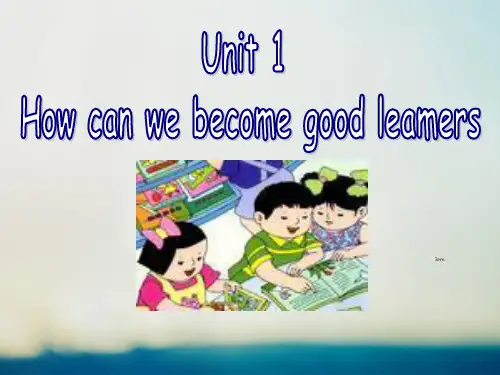
in the box.
practice develop remember prepare take notes until worry about everything
Are you stressed out each time
speaking in class
speaking aloud
speaking crazily
speaking with a foreigner
speaking with friends
reading English crazily
reading English aloud
reading English textbooks
doing a lot of exercises
making flashcards
3 Give advice to these
people.
1. Jane is a very slow reader. She should improve her reading speed _____________________. 2. Li Ming wants to improve his listening. He should practice his listening __________________________.
or with friends after class. Then remember ________ what you learned by doingpractice exercises. Try to study and
________ information bit by bit until instead of waiting ______ the last
Unit 1 课件(共35张PPT) 人教版九年级全册
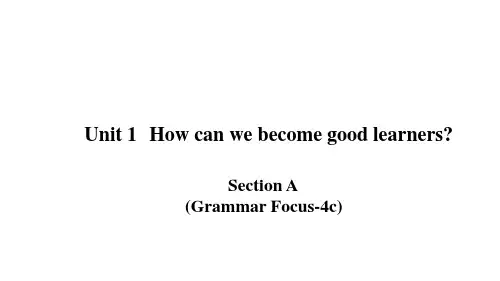
1) It is no use/ good / useless + doing... 2) It is a waste of time + doing ... 3) It is fun + doing ... 在以上结构中常用动名词作主语。 It’s no use crying over spilt milk. 覆水难收。 It is fun playing with children. 和孩子们一起玩真好。
New words
Unit 1 Section A (Grammar Focus-4c)
repeat /rɪˈpiːt/
v.重复;重做
note /nəʊt/
n. 笔记;记录 v.注意;指出
pal /pæl/ n.朋友;伙伴 physics /ˈfɪzɪks/ n. 物理;物理学
chemistry /ˈkemɪstri/
A. playing B. to play C. play
Textbook
Unit 1 Section A (Grammar Focus-4c)
4a Match the questions and answers.
1. How do you practice speaking?
a. By watching English programs.
A. tell B. to tell C. telling
Grammar Focus
Unit 1 Section A (Grammar Focus-4c)
2. 用作宾语 1)作动词的宾语 常见的此类动词有:practise, understand, worry about, finish, give up, keep, keep on, look forward to, mind, miss, enjoy, depend on, cannot help, suggest, pay attention to, think about, succeed in, be used to, get used to, put off,等。
(新人教版)英语九年级全册:Unit 13 全单元ppt课件(223页)
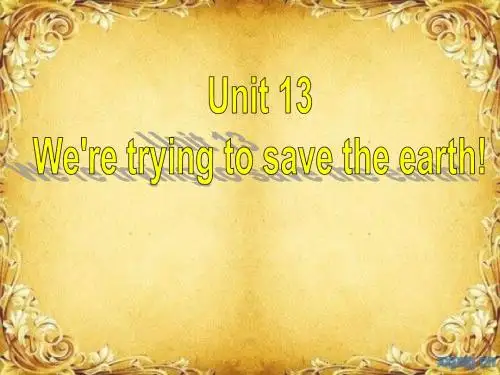
1c
The river was dirty. Even the bottom of the river was full of rubbish.
But it used to be so clean!
Yes, but people are throwing litter into the river.
Yes, everyone in this town should play a part.
We should write to the government and ask them to close down the factories.
What else can we do?
Everyone should help to clean up the river.
bring a bag to go shopping. use chopsticks or forks at home.
throw rubbish in the bins.
Jason and Susan, what are your ideas for solving these problems?
litter和rubbish都可指“垃圾”,用作 不可数名词。 rubbish指“没用的东西(被扔或将要丢 弃的无用的东西)‖不可回收。
litter指“(室内或公共场所)乱扔的废物 (纸屑、不要的包装纸、废瓶等)‖还可 回收。 e.g. Throw the rubbish out. 把垃圾扔出去。 The room is full of rubbish. 房间里堆满了垃圾。 Pick up your litter after a picnic. 野餐后将废弃物收拾好。
The earth is polluted.
最新人教版九年级英语全一册英语教学课件PPT汇总
4. Be quiet! He hasn’t finished__________ (speak). 5. —What about__________ (join)an English club to improve English? —That sounds good. 答案: 4. speaking 5. joining
3. ——我怎样才能读得更快? ——通过按意群读你能读得更快。 —__________ __________ __________ read faster? —You can read faster__________ __________ word groups. 答案: How can I; by reading
1. be afraid to害怕去做; 不敢去做 【语境领悟】 *But I was afraid to ask questions because of my poor pronunciation. 但是因为我糟糕的发音, 我害怕问问题。 *Betty is afraid of the dark, so she is afraid to go out alone at night. 贝蒂怕黑, 所以她晚上不敢单独出去。
Ⅱ. 短语互译
1. be afraid to ______________
2. as well
______________
人教版九年级英语全一册(全套)精品课件
Unit 4 I used to be afraid of the dark.
人教版九年级英语全一册(全套)精 品课件
Unit 5 What are the shirts made of?
人教版九年级英语全一册(全套) 精品课件目录
0002页 0042页 0090页 0274页 0342页 0429页 0431页 0503页 0528页 0588页
Unit 1 How can we become good learners? Unit 3 Could you please tell me where the restrooms are Unit 5 What are the shirts made of? Unit 7 Teenagers should be allowed to choose their own Unit 9 I like music that I can dance to. Unit 11 Sad movies make me cry. Unit 13 We're trying to save the earth! Unit Notes on the Text Unit Grammar Unit Vocabulary Index
Unit 1 How can we become go册(全套)精 品课件
Unit 2 I think that mooncakes are delicious!
人教版九年级英语全一册(全套)精 品课件
Unit 3 Could you please tell me where the restrooms are?
人教版九年级英语全一册(全套)精 品课件
英语人教版九年级全册英语课件
2015 年九年级第一学期期末考试试卷 英 语 CCCCC A B 时量: 120 分钟 满分: 120 分 第一卷 选择题(共 80 分) 一、听力技能 第一节 听音辨图。
听下面的 5 段对话,根据所听到的内容,选择相应的图画。
听 每段对话前,你将有时间阅读各个小题,每小题 5 秒钟。
听完后,各小题将给出 5 秒钟 的作答时间。
(共 5小题,计 5 分)第二节理解。
(共15 分:每小题 1 分,计15 分)听下面的对话或独白,每段对话或独白后各有一个或几个小题,从题中所给的三个选项中选出符合对话或独白内容的最佳选项。
听每段对话或独白前,你将有时间阅读各个小题,每小题 5 秒钟。
听完后,每个小题将给出 5 秒钟的作答时间。
听下面的对话,回答第 6 小题。
6.Who couldn ' t understand the English teacher?A.Tom.B. Mary.C. Bob.听下面的对话,回答第7 小题。
7. What color clothes did Tara use to like?10.What does Tom think he should be allowed to do?A.To wear long hair.B. To get his ears pierced .C. To choose his own clothes. 听下面的对话,回答第11-12 小题。
11.What are some people building near the woman house? ' s A. A house . B.A road. C. A bridge.12.How long have the people worked?听下面的对话,回答第13 至14 小题。
13.Why did Lin Yue make the call?A. To say hello.B. To say thanks.C. To say sorry.14.How will Lin Yue get back?A .By bus. B. By train.听下面的对话,回答第15 至17 小题。
Unit 6 九年级英语全册 人教版 课件(共23张PPT)
Popularity
vent in B__er_l_in__ in the year __1_9_3_6___
other team's _b_a_s_k_e_t__
most famous games:
Байду номын сангаас
___N_B_A___g_a_m_e_s_____
played by _o_v_e_r_1_0_0__m__il_li_o_n_ people popular games in
在硬地板上
_______o_n__a_h_a_r_d__fl_o_o_r________
把……分开
_________d_iv_i_d_e_…__in_t_o_______
不仅……而且…… 钦佩;仰慕 实现梦想 鼓励……做…… 梦想成为英雄 ……的数量 阻止……做……
__n__o_t _o_n_ly_…__b_u__t _a_ls_o_.._ _____lo_o_k__u_p__to_…______ __a_c_h_ie_v_e_t_h_e__d_r_ea_m__s__ _e_n_c_o_u_r_a_g_e_…__t_o_d_o__…__ dr_e_a_m__o_f__b_ec_o_m__i_n_g_h_e_r_oes ___th__e_n_u_m__b_e_r_o_f_…____ ___st_o_p_…__f_r_o_m__d_o_in_g___
Where : It’s played inside on a__h_a_rd__floor.
How many teams: _d_iv_i_d_e_people _i_n_to__two teams Rules: get the ball in the other team’s____b_a_s_k_et_.
- 1、下载文档前请自行甄别文档内容的完整性,平台不提供额外的编辑、内容补充、找答案等附加服务。
- 2、"仅部分预览"的文档,不可在线预览部分如存在完整性等问题,可反馈申请退款(可完整预览的文档不适用该条件!)。
- 3、如文档侵犯您的权益,请联系客服反馈,我们会尽快为您处理(人工客服工作时间:9:00-18:30)。
情境引入
I love music that I can sing along with.
I prefer music that has great lyrics.
lyrics(歌词)
I don’t like music that is too loud .
. 随堂练习阅读下列句子,再用who/that 填空。 1.I have a brother __w_ho____ likes soccer. 2.Tom doesn’t like movies ___th_a_t __are too long and too scary. 3. We prefer groups __th_a_t ____ play loud and energetic songs. 4. He likes friends ___w_h_o ____ often help each other.
活动探究
What kind of music do you like?
I like music that___________
Task One
活动探究
Pairwork
A: What kind of music do you like ? B: I like music that I can sing along
延伸拓展
Grammar
定语从句(The Attributive Clause)
在复合句中修饰名词或代词的从句叫做定语从句。
I love singers who write their own music.
先行词 关系词
定语从句
I like music that I can dance to.
延伸拓展
I like musicians who play
different kinds of music
活动探究
如果你是学校广播站的广播员,学 校委派你去购买一些学生们喜欢 的歌曲光碟. 请你先做一个调查. 看看学生们喜欢什么样的歌曲,什 么样的歌手以及什么样的组合.
A: What kind of songs do you like? B: I like the songs that __________________. A: What kind of singers do you like? B: I like the singers who _____________________. A: What kind of groups do you like? B: I like the groups that _________________________.
1b
活动探究
Listening practice
1b Listen. Check (√) the kinds of music Tony
and Betty like.
√
√
√
2a
活动探究 2a Listen and circle “T” (for true) or “F” (for false).
小结作业 Summary
1.prefer….to….=like …better than…… 和…….相比更喜欢……
I prefer singing to dancing.
2.定语从句
先行词:人 (n.) + who + 从句 物 (n.) + that + 从句
Section A (1a-2c)
情境引入
Do you like music?
How many kinds of music do you know?
情境引入
pop music
情境引入
jazz music
classical music
情境引入
rock music
dance music
情境引入
I like movies.
Movies are about monsters.
I like moviesthat are about monsters
movies
延伸拓展
I prefer some friends.
Some friends like sports.
I prefer friends who like sports. friends
4. Xu Fei prefers groups that play quiet 1. and slow songs.
活动探究
2b Listen plete the sentences.
who write their own songs.
that’s really loud
who play different kinds of music.
情境引入
I prefer music that has great lyrics. (like better) I love music that I can sing along with. I like music that isn’t too loud. I like music that I can dance to. I like music that is quiet and gentle. I like music that ….
1. Carmen likes musicians who play different kinds of music.
各种各样的
2. Xu Fei likes the Australian singer Dan Dervish.
3. Carmen likes electronic music that’s loud.
with. What about you? A: I prefer music that has great
lyrics.
活动探究
I like Jay .He can write his own songs.
I like singers who write their
own songs
活动探究
I prefer him.He is a great musician.He can play different kinds of music.
